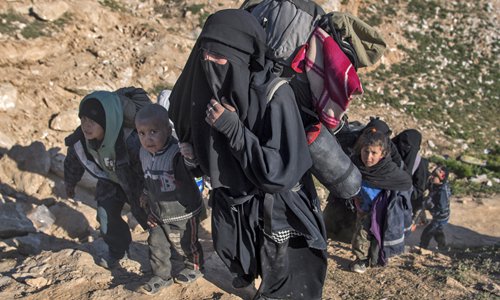IS built up arsenal after ‘red flags’ ignored: CAR’s study
Source: AFP Published: 2020/12/8 17:23:40
IS built up arsenal after 'red flags' ignored: study
Islamic State jihadists were able to build up a major arsenal of explosives, weapons and drones through a sophisticated procurement process that saw "red flags" ignored by governments and suppliers, a monitoring group said on Tuesday.

IS was ousted in 2019 from its former strongholds in Iraq and Syria - where it had wanted to build an extremist so-called caliphate - but experts warned that the know-how and connections in its supply network have not gone away.
IS "procured key commodities through groups of linked, family-owned companies and individuals located near key border crossings into IS-held territory," CAR said, adding these groups were centered around the towns of Siverek and Akcakale in southern Turkey. The CAR emphasized there was no evidence that these companies were "witting accomplices" to IS procurement efforts or guilty of any wrongdoing.
"They nonetheless acted as key junction points within the supply chains that provisioned IS forces," it said.
They are based around two extended family groups in the area, it said.
It said that purchases of bulk explosive precursors and electronic items through this network had unusual features that should have raised "red flags."
Companies made large purchases of products that were "incongruent" with their business activities, it said, pointing to how a small mobile phone shop purchased six tons of aluminium paste from a large chemical distributor.
Mike Lewis, coauthor of the report, said the findings show how "surprisingly fragile" the procurement network was, relying on a small number of key individuals and businesses.
"With stronger due diligence, much of this trade might have been disrupted," he said.
Namir Shabibi, CAR's Head of Iraq Operations, warned that although IS forces may no longer hold territory, remaining cells have become increasingly active in the past year.
"Preventing their procurement efforts by spotting the kinds of red flags detailed in this report remains important for countering the group's resurgence," he said.
The report said that overall more than 50 companies, in over 20 countries, produced or distributed goods that IS forces subsequently used to make IEDs, drones and improvised weapon systems.
As well as Syria and Turkey, countries from where materials were obtained included Britain, Denmark and Spain.
"Goods moved remarkably rapidly though IS forces' supply chains," the report commented.
The report also said that from at least 2015, IS technicians also sought to build sophisticated drones.

Civilians flee the Baghouz area in the eastern Syrian province of Deir Ezzor on Tuesday during an operation by the US-backed Syrian Democratic Forces to expel hundreds of Islamic State jihadists from the region. The ferocious battle for the terror group's last bastion in eastern Syria entered its fifth day as exhausted families left the ever-shrinking scrap of land where holdout jihadists have been boxed in by Kurdish-led forces. Photo: AFP
The Conflict Armament Research (CAR) group said in a study that IS was able to build up a store of material for a weapons production program in Iraq and Syria from 2015-19 via individuals and companies in southern Turkey and also elsewhere.IS was ousted in 2019 from its former strongholds in Iraq and Syria - where it had wanted to build an extremist so-called caliphate - but experts warned that the know-how and connections in its supply network have not gone away.
IS "procured key commodities through groups of linked, family-owned companies and individuals located near key border crossings into IS-held territory," CAR said, adding these groups were centered around the towns of Siverek and Akcakale in southern Turkey. The CAR emphasized there was no evidence that these companies were "witting accomplices" to IS procurement efforts or guilty of any wrongdoing.
"They nonetheless acted as key junction points within the supply chains that provisioned IS forces," it said.
They are based around two extended family groups in the area, it said.
It said that purchases of bulk explosive precursors and electronic items through this network had unusual features that should have raised "red flags."
Companies made large purchases of products that were "incongruent" with their business activities, it said, pointing to how a small mobile phone shop purchased six tons of aluminium paste from a large chemical distributor.
Mike Lewis, coauthor of the report, said the findings show how "surprisingly fragile" the procurement network was, relying on a small number of key individuals and businesses.
"With stronger due diligence, much of this trade might have been disrupted," he said.
Namir Shabibi, CAR's Head of Iraq Operations, warned that although IS forces may no longer hold territory, remaining cells have become increasingly active in the past year.
"Preventing their procurement efforts by spotting the kinds of red flags detailed in this report remains important for countering the group's resurgence," he said.
The report said that overall more than 50 companies, in over 20 countries, produced or distributed goods that IS forces subsequently used to make IEDs, drones and improvised weapon systems.
As well as Syria and Turkey, countries from where materials were obtained included Britain, Denmark and Spain.
"Goods moved remarkably rapidly though IS forces' supply chains," the report commented.
The report also said that from at least 2015, IS technicians also sought to build sophisticated drones.
RELATED ARTICLES:
- US strikes Iran-backed military group targets in Iraq, Syria
- Turkish parliament extends motion for cross-border operations in Iraq, Syria
- Turkish president vows to eradicate terror camps in Iraq, Syria
- French president pledges "concrete actions" to protect minorities in Iraq, Syria
- Iran vows to support Iraq, Syria to eradicate terrorism
Posted in: CROSS-BORDERS